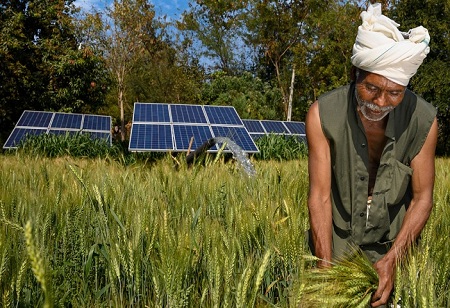
One-third of the world's food is produced by small-scale farmers, who are forced to deal with the worst effects of unpredictable climate change. They make up over 85% of all farms in the world and rely mainly on rain-fed agriculture, frequently lacking the resources needed to adapt to changing conditions. It is crucial to invest in farming practises that are robust to climate change and sustainable because small-holder farmers account for almost half of the world's hungry people.
On the eve of World Environment Day, India and Sweden collaborated to create a special "Smart Farm" to support a sustainable food production system and provide them with contemporary technologies. Small-hold farmers would be able to grow more food with much less water because to this cutting-edge farm's cutting-edge technology. It would deal with the urgent issues of excessive irrigation water use and lessen reliance on fossil fuels to boost output.
In accordance with bilateral Energy and Environment Memorandums of Understanding signed by Sweden and India, the Smart Farm was established. At the launch of the Smart Farm, Markus Lundgren, Charge d' Affaires at the Swedish Embassy and Head of Section for Trade, Economic, and Cultural Affairs, emphasised the growing difficulties of water scarcity and claimed that the issue is anticipated to worsen as the world's temperature rises. The following was highlighted by him: "The only way to meet the challenges that lie ahead is by utilising modern technologies."
The one-of-a-kind Smart Farm facility is situated on the grounds of the National Institute of Solar Energy (NISE) and uses cutting-edge technology from Spowdi, a green-tech engineering firm that just recently joined the Indian market. The employed technologies are adaptable and durable enough to function under adverse situations, extreme heat, and murky water.
The technology, known as the Spowdi Mobile Pro MKII, has been evaluated by NISE, a specialised and independent organisation working under the Ministry of New and Renewable Energy (GoI). The institute is evaluating how well it performs and how well it can drip-irrigate a 400 square metre plot of land with accurate water quantities and ideal pressure. The device uses a portable, 150-watt solar panel to provide power, demonstrating its effective utilisation of renewable energy.
"The solar-based micro-irrigation Farm," according to Jai Prakash Singh, deputy director-general of NISE (MNRE), "showcases a futuristic micro-irrigation system that can help deal with the challenges of watering farmland more effectively." The solar-powered Micro-irrigation Farm will act as a demonstration farm and a useful educational tool for organisations, agricultural universities, and farmer communities curious in cutting-edge farming methods.
Henrik Johansson, CEO of Spowdi, addressed the audience and stated: "Smart Farming methods and innovative technology can empower small-hold farmers in India, many of whom are women, to have an increased harvest, higher profitability, and better livelihoods." Farmers can save up to 80% of water by using the solar-powered Spowdi technology in conjunction with drip irrigation to deliver water straight to plants drop by drop. While drastically lowering water use, it can enable small-hold farmers improve and diversify their yields on already farmed land.
We use cookies to ensure you get the best experience on our website. Read more...